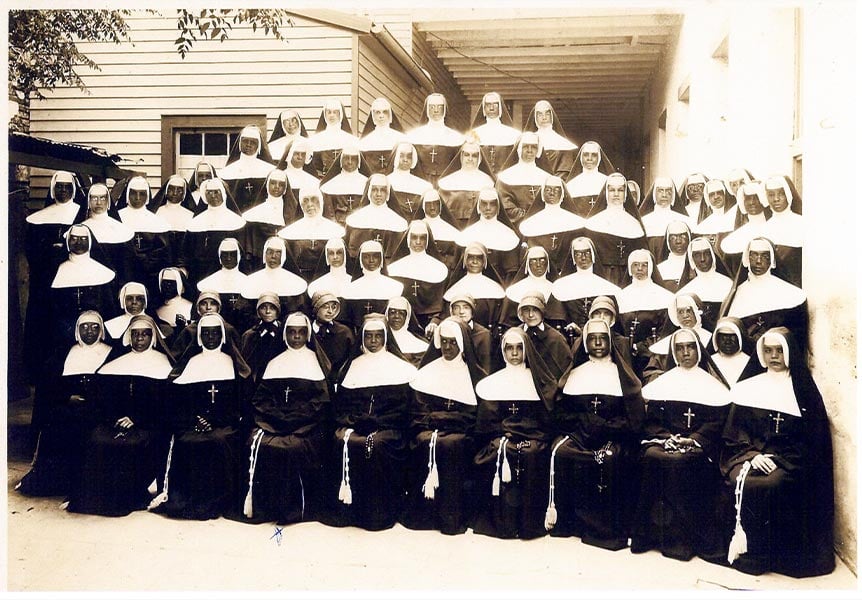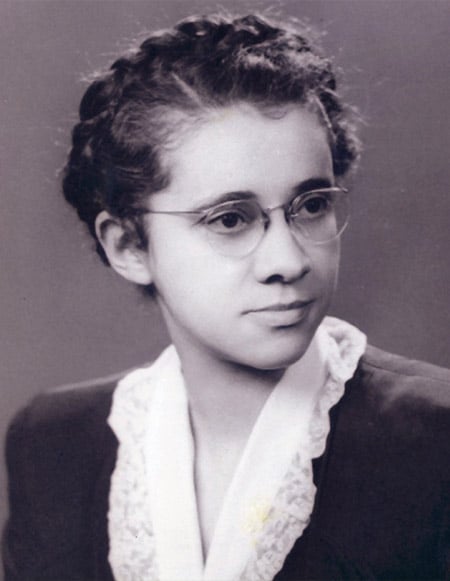U.S. Black Catholic nuns are overlooked desegregation pioneers

An archival photo of the Sisters of the Holy Family in Louisiana, circa 1920. This order was founded before it was legal for an African-American congregation to exist in the U.S. (Courtesy/Loyola University New Orleans)
As a public-facing historian of Black women, I have always relished the fact that Black History Month and Women's History Month are successive in the United States.
Having 59 (or in leap years, 60) straight days to amplify the stories of those who made monumental contributions to society, but who remain hidden figures to general audiences has always been an exciting time.
This is especially true when I get to disseminate new knowledge about the nation's Black Catholic nuns and their many unsung efforts in the long fight to desegregate American institutions.
During the Jim Crow era, members of the nation's African American sisterhoods quietly desegregated (or reintegrated) several Catholic colleges and universities, including Villanova College (now University), St. Louis University and The Catholic University of America.
Members of the Black orders and Black Catholic women and girls who desegregated white sisterhoods also became many of the first Black teachers, principals, professors, nurses and hospital heads at a host of previously all-white Catholic institutions across the country in the decades before and after the Brown v. Board of Education decision, which established the legal precedent to dismantle desegregation in public institutions and spaces.
In 1956, Frances Millicent Douglass, the first Black Daughter of the Heart of Mary, broke one of the nation's most difficult racial and gender barriers, when she became the first African American woman to chair a department at a historically white institution of higher education.
That September, Sister Douglass became the first African American department head at DePaul University in Chicago, where she was one of only 19 women faculty members and likely the institution's only Black faculty member.
Although distinguished historian John Hope Franklin is widely cited as the first African American to chair a department at a historically white institution of higher education, Sister Douglass began her term as the head of DePaul's psychology department in the same month and same year that Franklin assumed the helm of Brooklyn College's history department.

Affectionately known as "Frankie," Sister Douglass, a former case worker for Catholic Charities in Brooklyn, New York, and a former instructor at Xavier University and St. Joseph's College for Women (now Mount St. Joseph University) in Cincinnati, was recognized as distinguished leader in her field and was described by those who knew her best as "quiet, unobtrusive and brilliant."
In November 1957, the Delta Sigma Alumnae Chapter of Sigma Gamma Rho sorority in Chicago also named Sister Douglass "Outstanding Woman of the Year."
At the end of her term as the chair of DePaul's psychology department, Sister Douglass made history again when she became the first woman of color to head a department at Marquette University, where she led the Jesuit institution's psychology department from 1962 to 1965 and from 1970 to 1971.
Sister Douglass remained a full-time faculty member at Marquette until her retirement in 1978 and worked as a part-time instructor at the institution from 1978 to 1982.
Because members of her order did not wear habits, Sister Douglass' status as a nun was unknown to most, if not all, of her colleagues over the years.
Although Sister Douglass had a groundbreaking career in higher education, it was only a continuation of a series of pathbreaking firsts that achieved in her lifetime.
Even before she desegregated her order in 1946, Douglass seemingly became the first African American to earn a Ph.D. in psychology from Fordham University. She was also the first African American Catholic nun to earn a doctorate degree.
Born on Jan. 18, 1913, in Brooklyn, New York, to a schoolteacher mother and sales manager father, Sister Douglass was raised Episcopalian, but became Catholic in 1941.
Educated in Brooklyn's public schools, she earned a bachelor's degree from Alfred University in 1936, a master's degree from Fordham University School of Social Service, and a doctorate in psychology from Fordham in 1951.
When Sister Douglass died in Holyoke, Massachusetts, on Jan. 2, 1990, at age 76, little notice was given to the loss of a great American desegregation pioneer. Such has been true for so many of her Black counterparts in religious life.
Black sisters' desegregation triumphs not only remind us that seemingly insurmountable barriers and obstacles can be overcome, but also provide the intellectual armor and spiritual nourishment needed to withstand the concerted efforts of those who proclaim that marginalized peoples have no history worth remembering and thus no rights worth respecting or preserving.
In the face of the current campaigns aimed at criminalizing historical truth-telling in schools and public venues, identifying and championing history's hidden figures has taken on a new level of significance and urgency.
As such, I hope the church and nation at large will join me in proudly saying the name and telling the story of Sister Frances Millicent Douglass in honor of Black and Women's History Months 2022.
Sister Douglass' pathbreaking life and career deserve to be widely known and championed as we do for our most famous freedom fighters.
Shannen Dee Williams is associate professor of history at the University of Dayton. She is the author of "Subversive Habits: Black Catholic Nuns in the Long African American Freedom Struggle," which will be published May 2022. Follow her on Twitter at @BlkNunHistorian.
